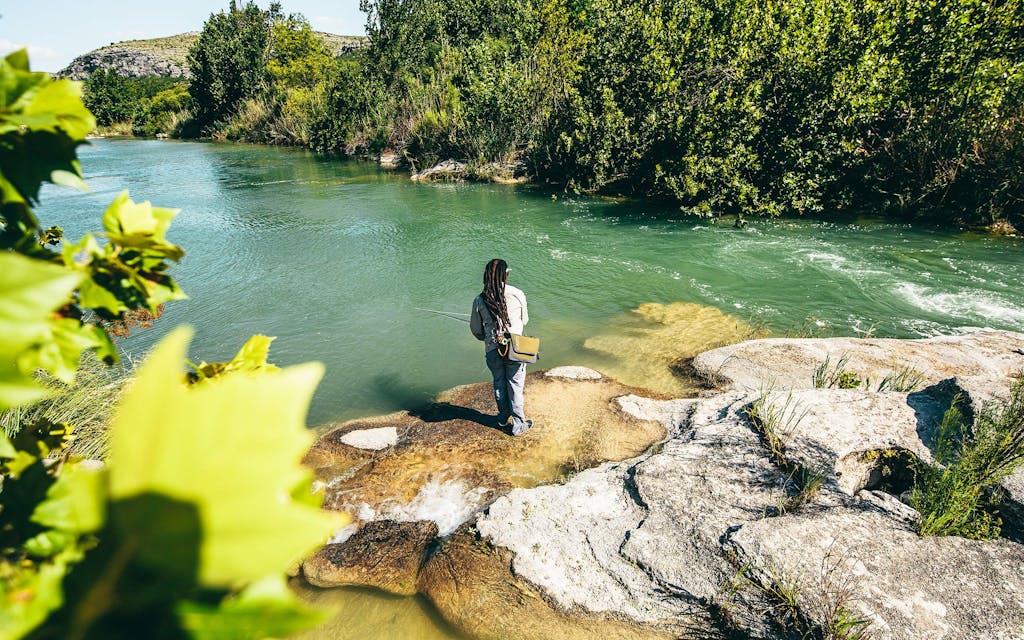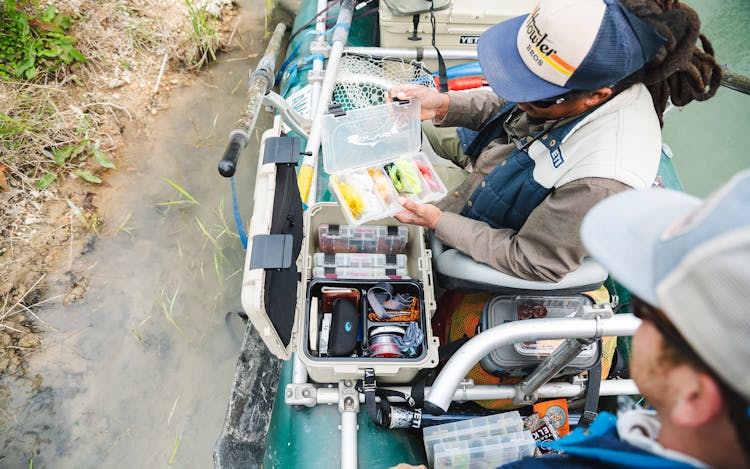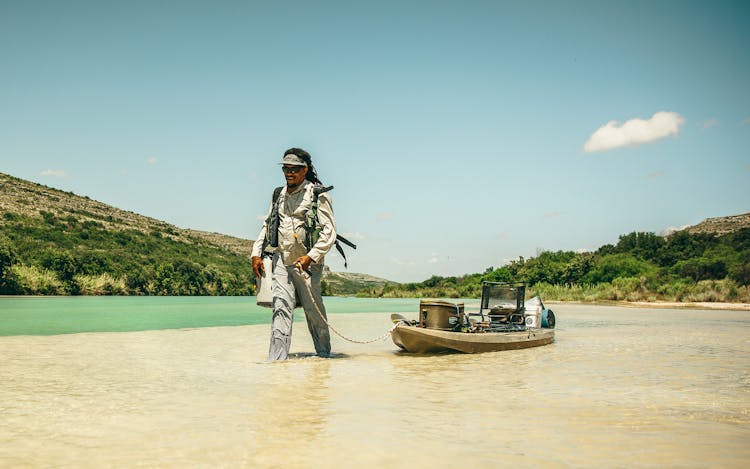“See that foam line under the cypress tree? Cast into it.”
Alvin Dedeaux says this in an offhand manner, with a slight Cajun drawl, and the effect is to make the clear directive sound more like a suggestion. This nonchalance is not typical fishing guide–speak, to say the least. But Dedeaux, 58, with his cool demeanor, bighearted laugh, and trademark dreadlocks flowing out from beneath his trucker’s hat, has never been mistaken for a typical guide.
As he quietly oars to keep us in place against the current of the Lower Colorado River, I follow his advice and cast into the foam. My fly, a crawfish pattern Dedeaux tied himself, smacks the surface heavily. After a few seconds’ pause to let it sink lower, I strip the line in before setting into another fish. This one turns out to be a largemouth bass, and it comes on the heels of four Guadalupe bass, Texas’s state fish. We’ve only been on the water for an hour, and I’ve already landed a freshwater drum and a large crappie, too.
“I don’t know what kind of grand slam that is,” he says, “but it must be some kind.”
“A Central Texas special?” I say.
“Could be,” he says. “Could be.”
Bass are a hallowed species in Texas, and there’s no shortage of dedicated anglers chasing them. But here, on the Lower Colorado, a stone’s throw from Austin’s Tesla Gigafactory, you’d have a hard time believing there are any other fishermen nearby. It’s mid-March and we’re totally alone, and while the temperature is still cool, the fishing is definitely not.
It’s only after releasing the largemouth that I’m able to convince Dedeaux to hand over the oars so he can pick up a rod. Within three casts he’s landed two largemouth of his own, and so he puts me back in the front of the boat, more out of compassion than any guiding etiquette. “I can come out here anytime,” he says. “You better get yours.”
Dedeaux, despite his laid-back nature (or perhaps because of it), has become the rare fishing guide who has reached celebrity status, at least in the niche world of fly-fishing. For the last twenty years, he’s done as much as anyone to introduce Texans to fly-fishing, a style of angling that’s practically become a religion in the Rocky Mountains but is often an afterthought in the Lone Star State, despite excellent opportunities in the Hill Country. And though he would scoff at terms like “celebrity” or “rock star,” those labels aren’t too far off, especially considering his prominent stint as the charismatic lead singer for the Texas funk band Bad Mutha Goose & the Brothers Grimm. Today Dedeaux is one of Texas’s most prominent—and chill—fly-fishing ambassadors, with more than twenty thousand dedicated followers on Instagram and a roster of big-name sponsors, including Yeti, Orvis, Gerber knives, and Howler Brothers. He churns out a steady stream of social media posts and videos that are unscripted, insightful, and a little meandering, not to mention full of his infectious laughs. This is to say, they are pure Alvin.
His posts are also refreshingly candid, free of the overly edited or slick, aspirational tone that’s common among social media influencers. In one YouTube clip from April, titled “Things Didn’t Go As Planned,” Dedeaux created an entire story around footage that anyone else likely would’ve left on the cutting-room floor: getting a line tangled, untangling said line, predicting a fish on a specific cast, and eating one’s words when no fish comes in. “I did catch one fish, one little guy, so I guess it wasn’t a completely pointless trip,” he says in the clip. “But I didn’t get to make the video that I wanted to make. . . . Anyway, you never know if you don’t go.”

These scenes are relatable, often because Dedeaux has an eye for the mundane moments that make up the majority of a fisherman’s life. The videos are not produced—they’re captured. They’re also all Alvin, all the time: Dedeaux films and edits all of his own clips, which puts the focus almost exclusively on him as the narrator. So when he does catch a fish, the payoff feels more, well, earned. It also helps that Dedeaux is a natural in front of the camera.
“I got comfortable being in front of people while I was in the band,” he says, “so being on camera, talking into it while the other people on the boat ignore me, is easy for me. But it still surprises me how many people tune in to my little YouTube channel.”
About those rock-star days: in the late 1980s and early 1990s, fresh out of college at the University of Texas at Austin, Dedeaux became one of the lead singers for Bad Mutha Goose & the Brothers Grimm. The band, put together by musician and artist Tim Kerr, exploded onto the 1980s punk scene in Austin, which had become infamous, thanks to pioneering bands like the Big Boys (also put together by Kerr) and breakout acts like the Dicks and the Butthole Surfers.
In the late 1980s, Bad Mutha Goose arrived, releasing a series of singles and the record Tower of Babel in 1991. The music was a frenetic mash-up of funk, punk, and rock, and the band recorded with the likes of DJ Jazzy Jeff & the Fresh Prince. During live shows, the musicians roused crowds into fits of wild, sweaty, reckless dancing. The band played the inaugural South by Southwest Music Festival in 1987, then returned the following year. Dedeaux was one of three lead singers, along with a guitarist, a bassist, a keyboard player, and a percussionist, but if you ask anyone who remembers a show from back in the day, it was Dedeaux’s onstage intensity that defined the band.
“It was a wild time,” Dedeaux says. “We had some big gigs, and it was pretty rare for a punk band that was playing original music to make a living. When we came up, it was either rock bands who made twenty dollars a night or cover bands that played Top Forty hits at frat parties. But we were able to support ourselves playing original music.”
Among other Texas venues, Bad Mutha Goose regularly played at Liberty Lunch, a seminal punk institution. The band was also booked all over the U.S. and did numerous tours on the West Coast. During a few shows in San Francisco, Nirvana opened for them. Bad Mutha Goose was even set to tour with the Red Hot Chili Peppers before plans fell apart at the last minute. Dedeaux and Kerr, who was inducted into the Texas Music Hall of Fame in 1996, were the driving force behind the band. “Literally,” says Dedeaux. “The two of us would drive the bus from Austin to L.A. or wherever else we were heading.”
On the cusp of stardom, things fell apart. “I think Tim felt like we were selling out, because we had gotten so popular and we were getting record-deal offers and money and all that,” says Dedeaux. “Whatever the reason, he got out, and he was the main creative force, so I got out shortly after.”
Dedeaux suddenly found himself aimless and looking for something to do. He’d grown up outside Houston and had spent most of his youth outside, fishing and doing anything else that involved being in the fresh air. His dad, who owned a small construction company, and his mom, a teacher, were both well versed in the outdoors. His father had grown up on “swampland outside New Orleans,” as Dedeaux describes it, and hunted and fished not just for fun but for utilitarian purposes. “My dad had the skill to make just about any fish or piece of meat taste delicious,” he says.
In school, Dedeaux came across a book about fly-fishing, and his parents got him his first fly rod for his twelfth birthday. He kept up with the sport through high school and college and even while fronting for Bad Mutha Goose. One day shortly after he left the band, he was mulling over his options with the owner of Austin Angler, a downtown shop that had become the de facto hub of fly-fishing in the city—a regular hangout for piscation-obsessed politicians and musicians alike. The owner, who had become a friend of Dedeaux’s, offered him a job. Working at Austin Angler put him in the center of the emerging fly-fishing scene in Central Texas. Soon he picked up kayaking and sport climbing, and he threw his considerable energy into those passions too.
Another fact about Dedeaux: he nearly died while bivouacked on the side of 18,491-foot Pico de Orizaba, Mexico’s highest peak, in 2001. In his twenties, while working at the fly shop, Dedeaux traveled all over Texas and the South to pursue climbing. At a certain point, a crew of guys decided to tackle the volcano in central Mexico, a famously difficult climb. Dedeaux jumped at the opportunity.
When summit day came, Dedeaux was ascending the mountain slowly and surely, but his climbing partner, who had sprinted ahead, eventually developed a pounding headache from altitude sickness. He was forced to descend to recover. Dedeaux, still feeling strong, told him to wait for him at the bottom of the glacier, roughly halfway up; he was continuing on.
Soon, though, the icy terrain became too much for a solo climb, and Dedeaux made the difficult decision to call off his own summit attempt. He turned around, only to discover that his climbing partner had not waited for him. As the night set in and the battery on his headlamp ran out, Dedeaux struggled to descend in the dark. It was so pitch-black that at one point he realized that had he taken another step, he would have plunged off a two-hundred-foot cliff. So Dedeaux emptied out his backpack, tucked his legs inside it, and waited until the morning. He awoke to a crew of other climbers on their way up the peak, and they nearly mistook Dedeaux for a corpse. He was frostbitten and delirious but alive, waving to them as they called out to him. They helped him off the mountain, much to the shock of his climbing partner. He’d abandoned Dedeaux, it turns out, because he had assumed he’d fallen to his death.
After the Orizaba incident, Dedeaux was ready for something a little milder. Through the fly shop, he found himself guiding anglers more often. Eventually he realized that, with a little bit of work, he could turn it into a real business, one he began focusing on in earnest in the mid-1990s. Texas didn’t have many fly-fishing guides at the time, and most of his peers were doing it as a part-time gig. Dedeaux, however, used his work at Austin Angler to grow a roster of clients. Texans are well known for pursuing fly-fishing in other states and remote corners of the globe, but they often overlook opportunities in their own backyard. Dedeaux introduced a generation of locals to Central Texas bass on the fly.


He also set himself apart with his speed and professionalism. “Back in the day, a lot of guides would take two days to get back to you via phone or email,” he says. “Now we got it set up so someone gets back to you in two hours.”
In addition to bass on the Lower Colorado and Llano rivers, Dedeaux helped clients chase rainbow trout on the Guadalupe River and redfish on the Gulf Coast. For a number of years, he also guided clients for trout in Colorado, migrating up north for the summer. Soon his calendar was fully booked months in advance. Eventually, in 2011, he launched All Water Guides to handle the overflow. It was designed as a guiding collective, so if he’s busy, another one of the company’s capable guides can take a client out (and vice versa). By sharing clients, the guides get a more consistent customer base.
“Alvin’s found a name for himself,” says Bonner Armbruster, a guide with All Water. “And it’s good for the rest of us, because we all get extra clients that come through him.”
It was during the early guiding days that Dedeaux met his wife, Lenée, who grew up in the West Texas town of Big Spring. She’d had her own series of career shifts, including years working as a talented freelance seamstress designing her own clothes and handbags. But, like Dedeaux, she shifted interests, earning a master’s degree in aquatic resources from Texas State. She started managing All Water Guides in 2016.
When I first reached out to Dedeaux about booking a trip, it was Lenée who let me know that “Alvin is booked up until the fall.” These days that’s standard protocol for Dedeaux, who’s in high demand. All Water has more than a dozen guides on staff, including Lenée. It’s one of the largest guiding collectives of its kind in Texas, and it’s devoted almost exclusively to fly-fishing.
“Anytime I have a work call with him, he’s making sure that we get gear into all of these young guides’ hands, people he’s nurturing and teaching,” says Jake Drees, the fishing marketing manager at Yeti, one of Dedeaux’s primary sponsors. “He’s kind of the old-timer now, and he’s embraced a different part of the fly-fishing business, one that’s about growing a community.”
Toward the end of our half day on the water, Dedeaux and I switch places again, and he reels in a flathead catfish, completing whatever grand slam this might be. In total, we land maybe twenty fish representing five species. It’s a good day on the water, but also a testament to what an underrated fishery the Lower Colorado is. And while fly-fishing has become more popular in this part of the state, it’s still a niche sport compared to the pursuit of largemouth undertaken by thousands of Texans on lakes and reservoirs.
For Dedeaux, the Lower Colorado is home water, so much so that he and Lenée, through All Water Guides, help organize an annual river-cleanup day with hundreds of volunteers. Earlier this year, Dedeaux also helped organize a sort of fishing contest on the Lower Colorado, which runs through August 2022. Dedeaux and fish biologists from Texas Parks and Wildlife went out and tagged thirty Guadalupe bass. If you catch one, take a photo of it and clip off the tag, and you can win free Yeti gear and will be entered into a grand-prize drawing.
On the water, I ask Dedeaux if he can give me some inside tips on where to fish for the tagged bass. He laughs and says it’s no secret. “Those fish move, so they’re all over. I can tell you we already caught one, but we let it go because the contest hadn’t officially started.”
At some point I also ask him the obvious question, about being a Black man in an outdoors industry historically dominated by white men. He answers in typical Dedeaux fashion, with a bit of a shrug. “My parents told me I’d encounter struggles,” he says, “and there were some, but I never really let it bother me.”
Maybe he’s downplaying the hurdles or doesn’t want to pick at the scars. But I also get the sense that when you’re on the water with Dedeaux, he takes the long view—the view that everything else, at least for the moment, is extraneous, including weighty discussions about water quality or racism. Those are conversations for later. Being on the water is about relaxing, and that’s what we’re doing.
When we get to the takeout at Little Webberville Park, we grab sandwiches from our respective vehicles and eat in silence. I notice Dedeaux looking at the sky and checking the weather app on his phone. The wind has shifted, and a cold front is coming.
“Are you thinking about going back out?” I ask.
“I’d like to,” he says. “I’m thinking about making a video, but not sure about the conditions. Got to keep the fans tuning in, though.”
“I bet the fishing will still be good.”
“Could be,” he says. “Could be.”
The video he makes that afternoon is the one titled “Things Didn’t Go As Planned.” In most cases on the water, as in life, they never do, but the result is often better than you could have predicted. And anyway, Dedeaux is still full of hope and a bighearted smile as I pack up my car. He’s gonna have a good day on the water no matter what.

